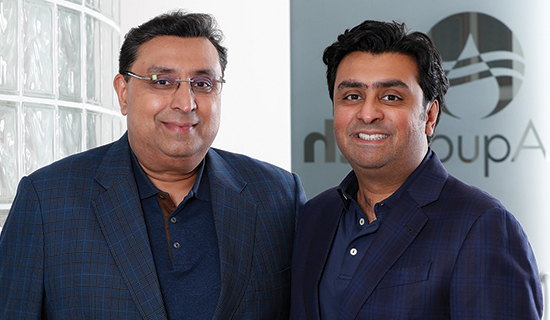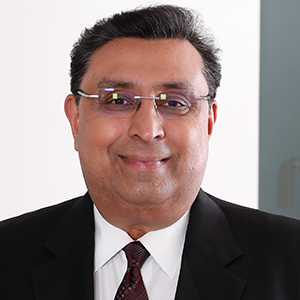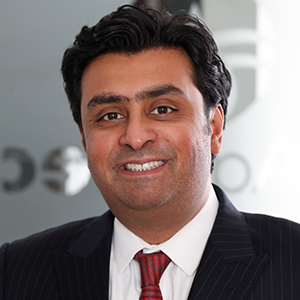From oil and gas to manufacturing, mining, chemical processing and more, numerous industries around the world rely on water for their operations — generating large volumes of wastewater in the process. To effectively manage, treat, recycle and reuse this wastewater, these companies rely on innovations from Aquatech.
Founded in 1981 by a chemical engineer from India named Prem Sharma, Aquatech began as a regional manufacturer of industrial water treatment equipment for Pittsburgh’s steel industry. Throughout the ’80s, the Canonsburg-based company steadily expanded its capabilities to help clients solve various water challenges.
Just 10 years later, in 1991, the founder passed away, leaving his 24-year-old son, Venkee, to run the company. By leaning on his mother and a strong support system of trusted advisers, Venkee carried on his father’s vision to continue growing the company. A few years later, his younger brother, Devesh, joined the team, and they have led the business together ever since — growing Aquatech from a regional supplier into a global leader in water technology.
Now, amid rising concerns about water quality and scarcity issues around the world, the Sharma brothers continue pushing for innovative solutions to meet clients’ increasingly complex water management demands.
“We help some of the world’s most recognized companies solve their water challenges,” Devesh says. “We utilize all of our capabilities to provide our customers with peace of mind when it comes to their water operations.”
Solving customers’ problems
Over the years, Aquatech has developed a reputation that spans the globe while completing more than 2,000 projects in 60 countries since 1981.
“We take on some of the world’s most complicated water challenges,” Venkee says. “Over the last 40 years, we’ve built tremendous capabilities to deliver solutions almost anywhere.”
Aquatech specializes in treating difficult-to-treat waters, like refinery wastewater, acid mine drainage and wastewater from wastewater treatment plants. To safely recover and recycle these wastewaters, the company constantly innovates new technologies, products and services. These solutions include desalinating seawater in areas where fresh water is scarce, and recycling wastewater to comply with environmental regulations in certain industries.
Even without regulatory impetus, many companies are implementing sustainability initiatives to conserve water, reduce discharge and improve their overall environmental footprint. This growing interest in sustainability has driven increasing demand for solutions from Aquatech like zero-liquid discharge (ZLD) — an advanced water treatment process that uses ultrafiltration, reverse osmosis and other methods to purify and recycle water, leaving “zero discharge” behind.
These technologies are central to Aquatech’s value proposition. By helping customers achieve their water goals with solutions that reduce water and energy consumption, operating costs and installation times, Aquatech drives efficiencies throughout clients’ operations.
“We help our clients reduce costs of disposal as the world is becoming more environmentally conscious,” Devesh says. “We help by improving the operation of their existing infrastructure, so their plants work better.”
Expanding through the years
Under the Sharma family’s leadership, every era of Aquatech’s history has brought new growth opportunities as the company expands its capabilities.
In the ’90s, for example, Aquatech embarked on international expansion — starting subsidiaries in the Middle East, India and China to better serve clients who were expanding into those regions. Aquatech maintains these global operations today, with more than 700 employees at several sites around the world.
During the early 2000s, Aquatech’s growth focused on technological innovation like launching in-house research and development (R&D) efforts, licensing new water treatment technologies, and acquiring and developing new solutions such as ZLD.
Now, Aquatech’s global presence and cutting-edge capabilities position the company for its next phase of growth.
“The last decade has been about taking all of those opportunities and capabilities we’ve gained and moving to our next horizon, which is delivering water technology as a service,” Devesh says. “Rather than sell the system, we’ll operate it ourselves and sell the water to the client, and completely simplify the offering.”
To support this growth, Aquatech recently built a new laboratory and testing facility at its Canonsburg headquarters. Although the company already operates similar labs in other locations, including Milwaukee, this addition expands Aquatech’s local R&D capabilities.
“As water needs become more complex, clients’ water specifications also become more stringent,” Venkee explains. “So, our business model has been evolving to one that involves development, testing and validation of treatment processes that meet their needs.”
Growing the team
Venkee and Devesh agree that the key to the company’s growth is its people.
“Our success can largely be attributed to our team, who understand our customers, trust our vision and work together to drive growth,” Devesh says.
However, recruiting and retaining the right people to join the team as the company grows can be challenging. To address this challenge, the Sharma brothers are coming up with new ways to bring employees into the company.
For example, as people have become more comfortable using remote collaboration tools since the pandemic, this virtual work environment has opened the door to a new pool of candidates who don’t necessarily live near Aquatech’s office.
“We’ve had to open our minds when we’re hiring,” Devesh says. “It used to be, ‘We need to find the best candidate in Pittsburgh.’ And then it became, ‘Let’s find the best candidate in the United States.’ Now, the best candidate could be anywhere: a mining expert in Santiago, Chile, or a water expert in Spain.”
Yet, as an engineering business, Aquatech still values face-to-face interaction, and certain positions that involve hands-on work still need to report to physical locations. So, while Aquatech may consider remote candidates for some positions, Devesh says they’re easing into this new hiring method with a balanced approach, depending on each job opening.
Meanwhile, to build a healthy pipeline of candidates, Aquatech is also developing an internship program to mentor young graduates over several years, with the goal of ultimately hiring qualified interns. “It can’t be a transactional thing,” Devesh says. “It’s an ongoing approach to bring in the right talent.”
Staying power
The other labor challenge, which can be just as difficult, is keeping talented employees on the team once they’re there. Orientation sessions are vital for onboarding new hires, Devesh says. But in addition to the typical onboarding program, Aquatech has also ramped up other efforts to keep employees engaged.
It started during the pandemic, when Venkee and Devesh took turns writing weekly emails to keep employees updated. Before long, the brothers realized how much their team appreciated the frequent communication. Now, they’ve made regular check-ins part of their permanent plan.
“You can never overcommunicate,” Devesh says. “When we came out of the pandemic, we said, ‘We have to have more touchpoints with our employees.’”
Prior to the pandemic, Aquatech hosted yearly town hall meetings to share company updates with employees. Since then, they’ve moved to a quarterly town hall schedule, hosting meetings online so employees can attend from any location. In the off months, they send written communications to keep employees apprised between meetings. They also established monthly Q&A sessions for new hires, giving them additional opportunities to engage with executives while learning more about Aquatech.
Even before ramping up communications, Aquatech boasted impressive retention rates. More than half of Aquatech’s employees have been with the company at least 10 years; 25 percent of those employees have over 20 years’ experience, and 10 percent have over 30 years’ experience.
“We have excellent retention, but the first two to three years are critical,” Devesh says. “In those early years, we have to do more. We have to overcommunicate.”
Supporting roles
To support the company’s ongoing growth, Venkee and Devesh recently stepped into new roles. In February 2022, Venkee transitioned from CEO to executive chairman, and Devesh, who had been serving as managing director, moved into the role of CEO.
“It’s not necessarily a leadership transition, because we’re kind of fungible,” Venkee says. “We’ve always worked in such a way that we don’t overlap that much, which has been a strength for us.”
In his new role as executive chairman, Venkee will direct the company’s strategic plan, while Devesh leads day-to-day operations as the CEO. Their shared goal, regardless of their titles, is to support the key management team that surrounds them.
“The biggest challenge as we’re going through ongoing growth has been allowing our key management team to do what they do best,” Venkee says. “In a key shareholder-run business, things are usually built around supporting the owners that are running the business. We’re trying to flip that narrative to support our key management.”
This shift begins, simply, with communication. Five years ago, for example, Aquatech’s Monday morning management meetings focused on what needed to be done. Now, Devesh and Sharma also make a point of asking what their managers need from them to accomplish those tasks.
“If we make sure the goals are clear, so everybody knows what they need to do, and then support them to say, ‘What do you need to achieve these?’ we can reduce the roadblocks and achieve our goals,” Devesh says. “It’s more coaching, supporting and guiding, rather than saying, ‘Do this.’”
By investing in employees through this support system, Venkee and Devesh are building relationships to drive long-term growth. Looking beyond the next quarter toward the next generation of leaders, the brothers are guiding the company toward sustainable growth as they innovate new technologies and expand into new markets.
While their approach has evolved through the years to meet changing customer needs, their mission and focus remain the same: to help clients solve their water-related problems.
“Focus on building a company that your employees and customers trust,” Venkee says. “In the backdrop of a quickly consolidating industry, we remain stable and reliable, so customers can count on us to consistently solve their problems.” ●
TAKEAWAYS
- Innovate solutions to specific customer problems.
- Open your mind to new pools of potential candidates.
- Overcommunicate to keep employees engaged.
- Support your management team.




